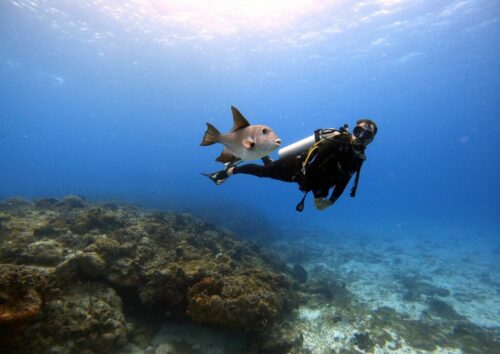The A-Z Guide to Scuba Diving: Master Your Skills with Amadive’s Experts
Scuba diving is more than just an underwater tour; it’s an art that requires knowledge, skill, and respect for the ocean. A great dive isn’t just measured by what you see, but by how confident, comfortable, and safe you feel beneath the surface.
Welcome to the Amadive Knowledge Hub. Here, we share core knowledge and skills honed over thousands of hours underwater, designed to help you evolve from a curious beginner into a confident and capable diver.

For the Curious Beginner: Answering Your First Questions
Stepping into a new world always comes with questions. Here are the answers to the most common concerns.
- Is scuba diving difficult? Scuba diving is not difficult, but it requires proper training. Anyone in good health who is comfortable in the water can learn through the PADI Open Water course.
- Do I need to be a strong swimmer? You don’t need to be an Olympian. The basic requirement is the ability to swim 200m (untimed) and float for 10 minutes.
- Will my ears hurt when I go deep? Your ears will feel the pressure, but you will learn a crucial technique called “equalization” to easily and safely manage it.
Learn more in our article [Answering the Top 10 Questions from New Divers].
Core Skills Every Diver Must Master
No matter how many dives you have, constantly refining these fundamental skills will make a world of difference.
1. Buoyancy Control – The Art of Weightlessness
This is the single most important skill in scuba diving. Mastering buoyancy allows you to:
- Conserve Air: Move gracefully and with less effort.
- Protect the Environment: Avoid accidentally touching or damaging fragile coral reefs.
- Increase Comfort and Safety: Fully enjoy the feeling of weightless suspension.
Read our detailed guide: [5 Steps to Achieving Perfect Neutral Buoyancy].
2. Ear Equalization
A mandatory skill that you must perform repeatedly as you descend. Equalizing properly prevents discomfort and pressure-related injuries.
3. Underwater Communication
Learning and fluently using hand signals is key to communicating effectively with your buddy and guide, ensuring everyone is safe and on the same page.
Consult the guide [20 Essential Underwater Hand Signals Every Diver Must Know (With Illustrations)]
Advanced Techniques & Good Habits
Once you’re an experienced diver, you can focus on fine-tuning your skills.
- Improving Air Consumption: Learn techniques for slow, deep breathing and efficient movement to extend your bottom time.
- Using a Dive Computer: Understanding your dive computer is a vital safety skill. It accurately tracks your depth, time, and no-decompression limits.
- Dive Planning: A good diver is always involved in the planning process, understanding the dive site, expected conditions, and safety procedures.
Knowledge is power, especially in scuba diving. Continuous learning and practice not only keep you safer but also unlock even more amazing diving experiences.
Have another question? Don’t hesitate to contact the Amadive team of professionals. We’re always happy to share our knowledge!
Amadive – Professional Scuba Diving in Con Dao & Phu Quoc
Discover the endless beauty of the ocean with our leading dive experts.
- Website: https://amadive.com.vn
- WhatsApp: +84 39 241 9241
- Email: book.amadive@gmail.com
